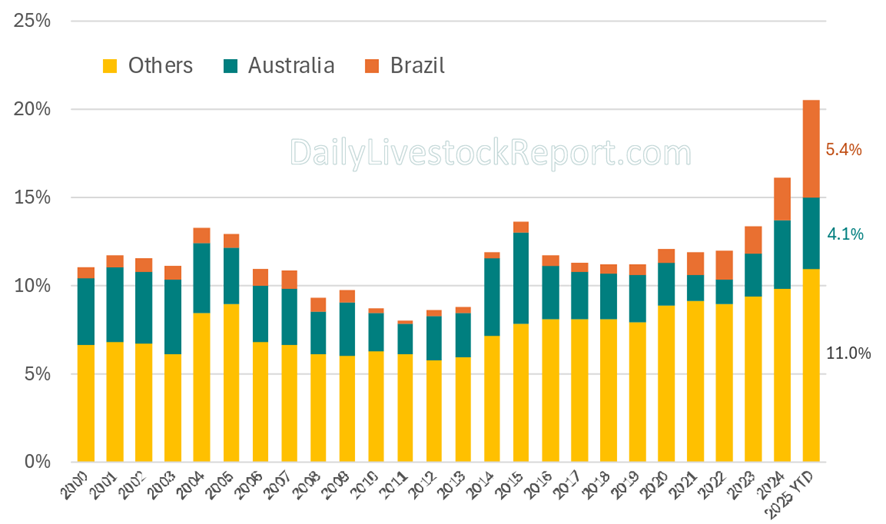Higher Tariffs - Higher Hamburger Prices


The additional 50% tariff on U.S. imports from Brazil put in place earlier this month will have implications for U.S. beef markets. Beef imports from Brazil operate under a tariff rate-quota system. Imports up to a specified quantity (quota amount) enter under a minimal tariff with shipments above the quota subject to a higher tariff. Brazil’s annual quota is 65,000 metric tons (MT) and shipments above the quota are subject to a 26.4% tariff. According to the Daily Livestock Report, beef imports from Brazil already exceeded the quota for the year in late January. Shipments for the first half of the year totaled more than 336,000 MT, 107% greater than the same period last year. Brazil was the largest supplier of imported beef over the period.
Tighter domestic beef supplies, reduced cow slaughter, and a strong consumer demand have led to an increase in U.S. beef imports. Imports are up 33% thus far this year and accounted for 20.5% of U.S. beef consumption through May. Last year beef imports accounted for 16%. Brazil alone accounted for 5.4% of total consumption according to the Daily Livestock Report (Figure 1). Most beef imported is lean trimmings used to make hamburger. With the additional 50% tariff, the total tariff on Brazilian beef imports now equals 76.4%. The additional tariff pushes Brazilian beef prices well above current U.S. lean beef prices. Thus, the additional duty will likely stop any further beef shipments from Brazil this year. Imports from Australia, New Zealand, or Argentina might make up for the loss, but it will come at a higher cost and won’t entirely replace Brazilian imports.
FIGURE 1. IMPORTS AS A PERCENTAGE OF U.S. BEEF CONSUMPTION

Source: Steiner Consulting using data from USDA Economic Research Service & National Agricultural Statistics Service, 7/31/2025.
The effects of the tariff can be seen in the most recent USDA forecasts. USDA reduced its forecasts for beef imports by 103 million pounds this year and 400 million pounds, or 6.1%, for next year largely due to the additional tariff. Lower imports will mean higher lean beef prices and higher prices for slaughter cows, a source for lean beef. The Daily Livestock Report said recent slaughter cow prices in the southern plains were 20% higher compared to last year at this time. Ground beef prices, already at a record high, will rise too. The Daily Livestock Report said USDA data showed the average price per pound of ground beef rose to $6.25 per pound in July. NBC News reported that ground beef prices above $6.00 occurred for first time in June since data collection started over 40 years ago. And higher hamburger prices aren’t the only costs consumers will face due to the additional tariff. The cost of Americans’ morning coffee will rise too. Ninety-nine percent of the coffee consumed in the U.S. is imported with Brazilian imports accounting for 34% of the coffee consumed.
President Trump said the additional tariff on Brazilian imports is in response to the treatment of his friend, former Brazilian President Jair Bolsonaro, by the Brazilian Supreme Court. The reasoning led The Economist to quip, “If Americans wind up paying more for hamburgers to help a friend of Donald Trump avoid his day in court, they will be right to wonder who is really being put first.”

